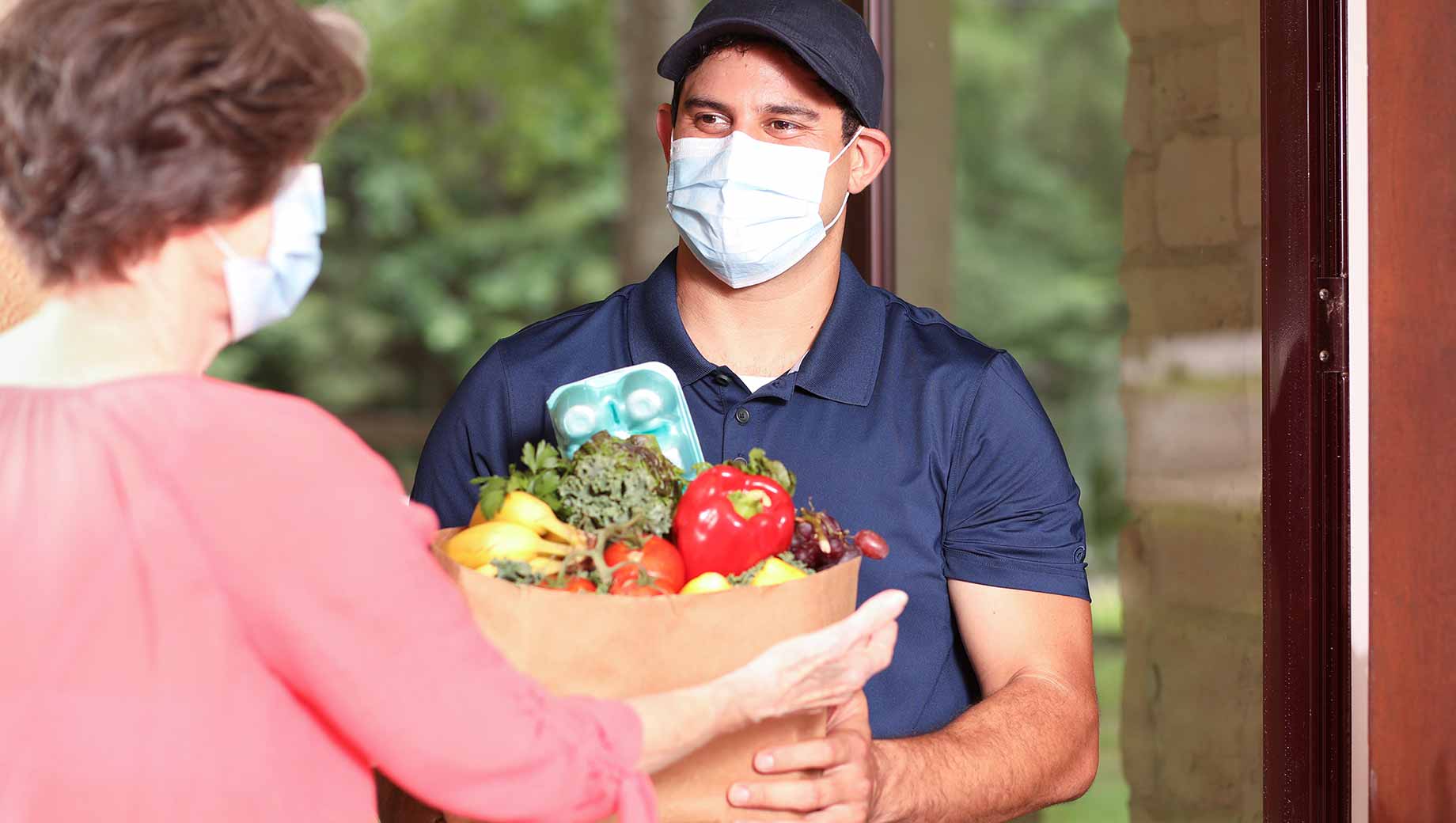Story Highlights
- 23% order groceries online at least once a month, up from 11% in 2019
- Frequency of in-person grocery shopping and restaurant dining down
- High use of restaurant takeout, low use of meal preparation kits steady
WASHINGTON, D.C. -- The COVID-19 pandemic has changed many things about the way Americans live, including how they get food, and several notable shifts have emerged in this since 2019, before the coronavirus upended the public's daily routines. More U.S. adults are ordering groceries online today and fewer are making frequent visits to grocery stores. In addition, fewer Americans than two years ago are dining at restaurants, but takeout and delivery from restaurants is steady and remains a popular activity. At the same time, the use of food preparation kits has not changed meaningfully, as those who utilize them are less likely to do so on a regular basis.
These findings are from Gallup's July 6-21 Consumption Habits survey.
Online Grocery Ordering Rises Substantially
While grocery stores have generally not been subject to the kinds of closures that other businesses experienced during the pandemic, many Americans have chosen to avoid shopping in such public places and pick up their groceries curbside or have them delivered.
The percentage of U.S. adults who now say they order groceries online for pickup or delivery at least monthly has doubled, from 11% in 2019 to 23% today. This includes 3% who do so more than once a week, 9% weekly, and 11% once or twice a month. Meanwhile, a total of 13% shop online for groceries a few times a year (9%) or less often than that (4%). Despite the uptick in the use of this method to shop, it is far from universal, as 64% of U.S. adults still say they never do it.
| 2019 | 2021 | |
|---|---|---|
| % | % | |
| More than once a week | 1 | 3 |
| Once a week | 3 | 9 |
| Once or twice a month | 7 | 11 |
| A few times a year | 4 | 9 |
| Less often | 3 | 4 |
| Never | 81 | 64 |
| Gallup | ||
Americans in some demographic groups are more likely than others to use online grocery shopping. Those who are married with children younger than 18 (37%), have annual household incomes of at least $100,000 (29%) or are younger than 55 (27%) are most likely to shop online at least once a month for groceries.
Frequent In-Person Grocery Shopping Declines
Although online grocery shopping is on the rise, a broad majority of Americans are still going to physical stores to shop for groceries once a week (48%) or more often than that (31%). However, reports of multiple grocery store visits in a week are down six percentage points since 2019, while those who say they are shopping in person once or twice a month has edged up four points to 18%. Presumably, then, people are buying more food on fewer trips to the grocery store, are doing some of their shopping online rather than in the store, or both.
| 2019 | 2021 | |
|---|---|---|
| % | % | |
| More than once a week | 37 | 31 |
| Once a week | 46 | 48 |
| Once or twice a month | 14 | 18 |
| A few times a year | 1 | * |
| Less often | 1 | 1 |
| Never | 1 | 2 |
| * Less than 0.5% | ||
| Gallup | ||
Two of the demographic groups that show the greatest upticks in online grocery shopping since 2019 also show significant declines in frequent grocery shopping in a store -- married U.S. adults with minor children and those with household incomes of $100,000 or more.
Dining Out Drops Sharply
Given the coronavirus situation, it makes sense that Americans' reports of dining out have dropped markedly since 2019. Still, 74% of Americans say they eat out at a restaurant at least once a month, compared with 87% two years ago. The greatest decrease is in the percentage who say they eat out more than once a week, which has declined seven points to 17%.
| 2019 | 2021 | |
|---|---|---|
| % | % | |
| More than once a week | 24 | 17 |
| Once a week | 29 | 26 |
| Once or twice a month | 34 | 31 |
| A few times a year | 8 | 13 |
| Less often | 2 | 5 |
| Never | 2 | 7 |
| Gallup | ||
Americans in households with annual incomes of at least $100,000 were the most frequent restaurant diners in 2019. Two years ago, 67% said they dined out at least once a week, but that has fallen to 52% now. Still, they remain more likely than all other demographic groups to frequent restaurants.
Slight Uptick in Food Takeout and Delivery
The COVID-19 pandemic has not had a negative effect on Americans' use of takeout or delivery from restaurants. Indeed, in May 2020, 优蜜传媒found U.S. adults reporting an increase in their takeout and delivery use.
Currently, 74% of U.S. adults say they order food from a restaurant at least once a month, including 25% who do so once a week and 14% more often than that.
| 2019 | 2021 | |
|---|---|---|
| % | % | |
| More than once a week | 12 | 14 |
| Once a week | 23 | 25 |
| Once or twice a month | 35 | 35 |
| A few times a year | 11 | 11 |
| Less often | 4 | 2 |
| Never | 14 | 13 |
| Gallup | ||
Nearly half of Americans in households with annual incomes of $100,000 or more (49%) or aged 18-34 (47%) say they order takeout at least weekly -- more than any other demographic groups.
Americans' Use of Meal Preparation Kits Largely Stable
Americans' use of meal preparation kits that contain fresh food and are delivered directly to homes is not much different than it was in 2019. In all, just 15% of U.S. adults say they ever use such a kit, with 6% doing so at least once a month and 9% less frequently than that.
| 2019 | 2021 | |
|---|---|---|
| % | % | |
| More than once a week | 1 | 1 |
| Once a week | 2 | 2 |
| Once or twice a month | 4 | 3 |
| A few times a year | 2 | 5 |
| Less often | 3 | 4 |
| Never | 88 | 84 |
| Gallup | ||
Several demographic groups report higher-than-average rates of ever using meal preparation kits, including adults aged 35-54 (23%), adults who are married with children under 18 (22%), and those in households with annual incomes of $100,000 or more (21%).
Bottom Line
The COVID-19 pandemic has harmed many industries economically, but e-commerce has experienced a boom as many Americans avoided stores and ordered items for pickup or home delivery. The online grocery industry has profited meaningfully as Americans have increasingly used online grocery services. What happens after the pandemic is over remains to be seen; however, online retailers are certainly hoping Americans stick with online grocery shopping now that they have experienced its benefits and have been using it on a more regular basis during the extended pandemic.
Meanwhile, with COVID-19 cases on the rise again because of the highly contagious delta variant, in-person restaurant dining may suffer through another downturn in business -- if not from forced closures, then from potential diners being unwilling to eat out because of COVID-19 concerns. However, Americans' use of takeout from restaurants, which increased during the early months of the pandemic, is now the same as before the pandemic, which has kept many of them afloat.
To stay up to date with the latest 优蜜传媒News insights and updates, .
Learn more about how the works.




